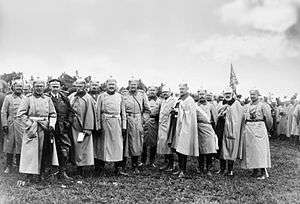Dietrich von Hülsen-Haeseler
Dietrich Graf (Count) von Hülsen-Haeseler (February 13, 1852 in Berlin, Germany – November 14, 1908 in Donaueschingen, Baden-Württemberg, Germany) was an infantry general of the German Empire.

The son of a Prussian general, Dietrich von Hülsen-Haeseler in 1870 became a lieutenant in the Prussian Emperor Alexander Guards Grenadiers. He attended the War College and was attached to the German General Staff in 1882. In 1889 he was made aide de camp to Kaiser Wilhelm II, whom he had known since boyhood.
In 1894 von Hülsen-Haeseler was named military attaché at the German embassy in Vienna. In 1897, now a colonel, he returned to Berlin as commander of a guards regiment. In 1899 he was promoted to major general, made chief of general staff in the Guards Corps, and then given command of the 2nd Guards Infantry Brigade.
From May 1901 until his death in November 1908 von Hülsen-Haeseler served as Chief of the German Imperial Military Cabinet, during which time he rose to General of Infantry.
Death
In November 1908, Dietrich Graf von Hülsen-Haeseler died of a heart attack while on a hunting trip in honor of the Kaiser. The hunting party was staying at Donaueschingen Castle; the Black Forest country estate of Prince Max von Furstenberg. During a formal evening function von Hülsen-Haeseler appeared dressed in the pink tutu and rose wreath of a ballerina, dancing for the Kaiser and his assembled guests.[1] Apparently exhausted by his exertions the general bowed, collapsed and was pronounced dead after hasty medical attention.[2][3] The circumstances were covered up by the officer corps so as not to further inflame public pressure over the homosexually themed Harden–Eulenburg affair. Ironically, it was von Hülsen-Haeseler who had organized the cover up of that scandal.
References
- Massie, Robert K. Dreadnought. Britain, Germany and the Coming of the Great War. pp. 690–691. ISBN 1-8441-3528-4.
- James, Harold, A German Identity: 1770 - 1990, New York: Routledge, 1989; p. 82
- Manchester, William (1969). The Arms of Krupp. Michael Joseph. p. 265.CS1 maint: ref=harv (link)
External links
| Wikimedia Commons has media related to Dietrich von Hülsen-Haeseler. |